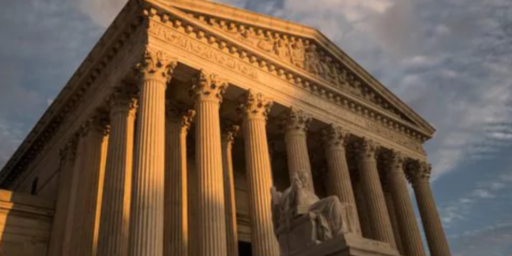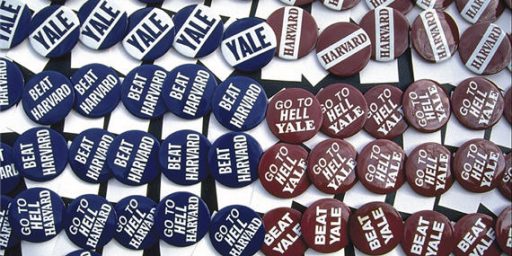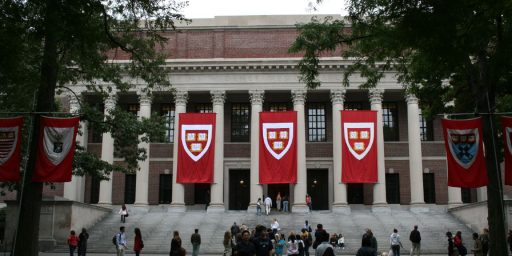What’s an Elite College?
How finite is prestige?

Dave Schuler makes an interesting observation vis-a-vis the recent college admissions scandal: “You can open a new college but you can’t open a new elite college.”
That’s probably true as far as it goes. If one looks at the US News rankings, almost all of the top national universities were started before the Civil War. A handful are older than the country itself. Three of the oldest—Harvard (1636), Yale (1701), and Princeton (1746)—have alternated the top spot for the last thirty years.
Still, it’s possible for prestigious schools to become less prestigious and vice-versa. Stanford held the top spot at the inception of the rankings in 1983 and for the next two iterations (1985 and 1988) but hasn’t been back. Granted, at #7, it’s still doing just fine. The University of Illinois at Urbana-Champaign, which debuted at #8 in 1983, is way down at #46 today.
It’s almost certainly not possible to create a Harvard, Yale, Princeton, or Stanford now. They have too much of a head start. But it’s certainly possible that a Duke or North Carolina or Virginia could rival them within a decade with sufficient investment. Ditto any of the other Ivies.
For that matter, one could imagine a multi-billionaire on a mission to create an elite university could start one in short order. Buy up an existing private school or even just a campus-sized plot of land somewhere with a beach, preferably within a reasonable distance of a major airport. Invest in the architecture for a modern campus. Hire away some top administrative talent from existing universities. Pay exorbitant salaries to lure a critical mass of superstar professors–preferably a mix of senior names with some productive tread on the tires but mostly young up-and-comers who would otherwise be competitive at current elite universities. Give them first-rate support staffs, lavish budgets for travel and research, and other amenities to make it easier for them to flourish. And then offer free rides to top students from around the globe.
Again, I don’t think even this school would have the cachet of a Harvard or Princeton, simply because they have a several-hundred-year head start in branding and legacy. But it wouldn’t take long at all for it to be “elite” by any reasonable definition.






The word ‘elite’ is bullshit. Just like the words, ‘A-list’ and ‘hotshot’ and ‘star’ and ‘new and improved.’ It’s nothing more than advertising. You spend a 100K getting through Harvard and you get to wear the Harvard label, just the way if you spend 60k you get to drive the BMW label or can spend 10K and wear a label that reads Gucci or whatever.
I’m not saying Harvard doesn’t offer excellent educational opportunity just that it means next to nothing in and of itself. The whole set of Harvard graduates tells you nothing about an individual Harvard grad. You can’t extrapolate usefully from the set of all to the set of one, unless you’re dealing with ants.
I guess my main takeaway is that elite college = Ivy?
Just a note, your formula on “how to build an elite college” is exactly how Duke operates though.
An elite college is where elite people send their kids. I am pretty sure that the families of Havard and Yale students were in the extreme right hand portion of the wealth curve in 1919 as in 2019. At least that’s what I glean from reading F. Scott Fitzgerald. This model of catering to the cream of society was successfully emulated by Duke in the South and Stanford in the West.
If we defined elite as having the best students than Carnegie-Mellon would jump in ratings.
There may be a regional element. Rich Texas oil guys send their daughters to SMU in hopes of keeping their virtue. Nobody farther away than Oklahoma cares, but it means something to their clients.
The ratings kind of fall apart for me after the first few. I doubt that UNC is materially better than Tulane.
We don’t have titles and hereditary positions to identify our betters. Michael Reynolds is right that a diploma from Harvard is a way of identifying social status that does not necessarily correlate with talent.
@Michael Reynolds: I think you’re right in principle and wrong in practice. I know quite well that there are mediocrities with Ivy degrees, even Ivy PhDs, and brilliant folks who dropped out of college or went to off-brand state schools. And yet I’ll give more credence to an individual job applicant who went to Harvard and be more skeptical of someone who went to, say, SUNY Binghamton. And I know that, more broadly, people decades out of school continue to get special treatment because of the prestige that their degree confers.
@joy: Pretty much. They just started long enough ago that it hasn’t been as obvious.
@Slugger: Harvard and Yale are much more meritocratic than they used to be because of standardized tests and the like. But, yes, there’s a huge leg up to children of means.
That isn’t how you could create an elite university at all. Sure you need good scholarship, but hiring some of the “top” professors is just going to infest your university with acolytes of the current elite universities. That’s not to say it isn’t a path to creating a school that would endure, but it would never unseat the “prestige goods” aspect of a Harvard or Yale. Harvard and Yale work hard to keep that Gucci pocketbook feel by seeding their alum in government/societal selection positions so that the right people are appointed or nominated for controlling positions. They also recruit popular actors, who will then be a recognized name on the list of alumni. The Kennedy School of Government does a good job of capturing the odd non-alum who makes it into the running for positions of government power.
This Uncommon Knowledge interview with Andrew Ferguson and Joseph Epstein makes some good points. The staus good nature, the fact that some of the worst people in the country go to Harvard and Yale (because it is a ticket punch), that universities change very slowly due to tenure and creation of fellow travelers to a professor’s ideology, etc. Peter Robinson quotes/paraphrases Thomas Sowell:
But we should consider that although Oxford and Cambridge, being technophobic universities in the 17th century, were not where the creators of the industrial revolution matriculated, much of our modern world coming instead out of the Scottish universities and the Scottish Enlightenment, they are still “elite” today. Granted, Oxbridge did not stay technophobic. Until you get those who are “chosen” into controlling positions in government and society selected from other universities in some significant number, the status good, “elite” label will be hard to tear away.
There’s no use taking about elite without grappling with the difference between Harvard and MIT. How one would go about creating a competitor for each is completely different.
Harvard is not just about the quality of education on offer, but about who is attending and why. Harvard is a lot of things: Gucci; a rite of passage, a prestigious name. But that’s not the heart of Harvard. The real Harvard is the scions of the elite rubbing shoulders with themselves as well as with the best and brightest. You’re not impressed? Well, you’re not even on their radar.
Don’t assume that I approve, because I don’t.
How did Notre Dame not make the list? Tradition and high standards.
Brackets come out Monday.
@Kit:
Sure. Again, there’s no way to compete with 400 years of tradition in that regard.
I would think it easier to create an MIT rival. CalTech and others come close. But my mythical billionaire could probably build an MIT analog in short order. Yes, it’s partly about prestige. But people go to MIT to be surrounded by the most brilliant mathematical and scientific minds more so than to rub shoulders with Old Money.
@Tyrell:
It’s a solid school but I’m not sure it’s the best in the state of Indiana. And it’s nowhere closest to the best in the Midwest–Chicago and Northwestern are obviously higher on most lists but I’d think Michigan, Wisconsin, Indiana, and others would be as well.
@James Joyner:
Sure there is! Simply get Harvard to admit students based purely on merit. This culls the scions. It will also go a long way towards smothering the Western idea of what a liberal education really means. Then add lots of money and clever marketing to recreate Harvard.
I guess the game is Harvard's (and Yale's) to win or lose. Then again, I get the impression that the bean counters have been in charge there for many years now, so perhaps the time is ripe.
“What’s an elite college?” Well, first it’s completely not the same thing as a great education.
I think you could build an elite-caliber institution as described in the post, but I am not sure you can imbue it with the elite prestige that some people are trying to buy.
(In many ways, UCI, where I went as an undergrad did exactly what James describes in the post, and it ranks well, but it isn’t going to be seen as an Ivy, or even USC).
Just a piece of data for the mix: Students who are accepted by elite universities but decide to go elsewhere suffer no future earnings penalty. What elite schools seem to be good at is identifying the best students, and the ones confident or ambitious enough to apply to the best schools. But they don’t actually give their students any earnings boost once they are out in the real world. Bear in mind, this is only undergrad. Grad programs are a different story, or specialty programs such as law or medical school.
@Steven L. Taylor: I think this is very dependent on the field of study. I can honestly say I would actually view it as a small negative if someone with a Bachelor’s in Engineering showed up with an Ivy League Diploma. Do the Ivies even have engineering programs? Ditto for science. The schools that caught my eye were MIT, Caltech, Stanford, RPI, Cornell, UNC at Chapel Hill, Carnegie Melon and my alma mater (RIT). The undergrads who came from those programs actually had a leg up, especially those that stressed co-op or internships (real jobs, not making coffee jobs). But I would guess that grad programs would look very favorably on undergrads from the Ivies because they had been so thoroughly screened.
@MarkedMan: Indeed: once you get into evaluating these places based on expert knowledge, that is a different issue.
Also don’t forget the difference between undergrad and grad school. I was constantly having to explain when I was teaching at UIUC that their Mat Sci department at that time was considered one of the best in the world and that yes, I had gone to MIT as an undergrad and my being at UIUC was in no ways a step down.
@MarkedMan:
This works the opposite way too. I know someone who graduated from Cal Tech with a degree in English. This is puzzling, at best. It seems like a waste of a Cal Tech education and makes me guess they flopped in physics or mechanical engineering or whatever their first choice as a major was.
How is Tom Monaghan’s school doing? After starting Ave Maria University in Ypsilanti, Michigan, he eventually bought some land and founded (incorporated?) a town in Florida to host it.
@Kari Q: there are a lot of us from MIT who have double-majored in (science/engineering) and (humanities).
@Grumpy realist:
A double major is not only fine, it’s impressive. This individual did not double major.
@James Joyner:
I’d probably go the other way. It depends what you’re looking for, I suppose. If I needed someone creative but willing to learn and work, I don’t think I’d be looking to the Ivy League.
A couple thoughts.
Engineering schools have come up in the thread.
1. If you want research scientists you go find MIT or CalTech type grads. They tend to work in academia or national labs. If you want people who make things in factories you go to the Ga Techs, Carnegie’s , Purdue’s, Lehighs etc of the world. An MIT grad is generally useless in a factory.
2. Engineering is a field where different schools have different high ranking specialties. Purdue currently has the top rated bioengineering program. I’ll bet it’s civil engineering program is vanilla. Etc etc.
Moving on –
I went to a business school, Chicago, that perpetually rotates with Harvard, Wharton and Stanford in the top 4. It was rigorous. You rubbed elbows with high octane students and professors; more than you find at IU, or SUNY. You really can’t operate in the M&A world without a solid grounding. That’s all fine and well. But……..what seems to be missing from the discussion is that a few years out of school you better not be talking about where you went. You better be talking about what you have done and what you can do. If you are still wearing your diploma on your sleeve you are a lawyer or a loser.
I’d suggest the same goes for undergrad programs. It’s certification and probability of success. But then you’d better perform.
@Kari Q:
Or, alternatively, it simply reflects natural abilities. I started out as an Electrical E major……..and was hopelessly lost. And I mean lost. Then I went over to Chem, and it was like taking candy from a baby. Totally intuitive, and childs play .
@MarkedMan: p
Do Ivy’s have engineering programs? Brown and Cornell do.
@MarkedMan: Well, it’s a bit more complicated than that:
So, it depends. In the main, really smart, ambitious kids who could have gone to UPenn but instead went to Penn State are going to do just fine. But there are prestige effects for those whose parents are further down the ladder.
I got into West Point but didn’t graduate and for economic reasons that meant Jacksonville State, the local school, rather than an alternate top-ranked school. I wound up doing just fine. But a West Point pedigree would have almost certainly been a substantial advantage. And I’d have probably gone to a more prestigious PhD program simply because I’d have known better.
There are also fields–academia, journalism, the think tank world that I know of but likely many others–where degree prestige constantly matters.
@Guarneri:
This is so true. Once I was hiring people with experience I usually stopped reading the resume before I reached the education part.
@Guarneri:
“Do Ivy’s have engineering programs? Brown and Cornell do.”
Penn, as well.
@James Joyner: I think it’s also because having the degree from an elite university allows such people to a) negate stereotype threat in their own minds, and b) whack other stereotypes that people might have of them. I know that as a woman having a degree from MIT I’m not considered a fluffy little airhead.
You may not want to hear this, grumpy r, but we, in an odd way, share a commonality. My thesis professor was an MIT prof who left for Purdue. He worked on the Manhattan Project, held multiple patents in the extractive metallurgy field, and still has schools referencing his cleverly titled book – Extractive Metallurgy – as the Bible in the field. His name was Reinhardt Schumann Jr.
@Guarneri: Heh. We all bounce around and have connections with each other. My dad worked in chemistry (and on stuff related to the Manhattan Project). Ended up as prof. at Ivy League university. I have connections to a slew of universities and national research labs both in the US and abroad either having done research, had a post-doc there, or having gotten a degree there.
Major problem I notice having gone to multiple locations in U.S. is you’re on the begging list for ALL of them.
Interesting article over at Guardian talking about the prevalence of Eton grads in the U.K.government and how the “Eton culture” produces individuals who are arrogant and incompetent. Which I think brings out the end question: ok, someone’s gone to an “elite university”–what has said individual done with his opportunities? Did the experience really jump-start his productivity? Or is he spending the rest of his life swanning about “having gone to X” and Peter Principling his way up the ladder on his connections?
P.S. This is why it’s so difficult having gone to MIT….you are then expected to start at least one billion-dollar tech company. I’m still working on mine, grumble.
Found the Guardian article. Don’t know if I completely believe it, but it’s pretty obvious the U.K. has been led by a bunch of not-very-competent individuals recently.
@grumpy realist:
I’ve long contended that 80% of the decline of American industries in the 70’s and 80’s was due to adapting the business theories promoted by Harvard MBA’s.
@Guarneri: Most people who talk a lot about their school are usually into the sports angle. I seldom if ever have heard someone talk about the other aspects of their college, unless someone asks them about it.
There are those who are obsessed with their college sports.
@Moosebreath:
Norman Mailer majored in engineering sciences at Harvard, though he took creative writing courses for most of his electives.
@MarkedMan:
Harvard MBAs were traditionally taught that the important thing was to make a quick decision rather than the right decision, which explains a lot about the utter screw-ups of numerous businesses.
Beating up on Harvard MBA types is always fashionable. It seems to practically be a requirement of scientists, engineers and IT types. Oh well, whatever make one feel good. But having been on both sides of the ledger, BS and MS in engineering, a process engineer for years, and then MBA and serial business owner, I will tell you its not that simple – IMHO. ( I always tell technical people “come on in if you’ve got all the answers, the water is warm.”) I would also point out that the equation for success requires much more than just intellect. Far too underrated are perseverance, intuition and people skills; and most underrated is what no one can teach: risk tolerance. Very few are willing to put it all out there.
@CSK:
I’ve never, ever seen that taught or advocated.
@Guarneri:
Well, it certainly was at HBS in the 1980s. The school overwhelmingly graduated investment bankers and management consultants. The former wore red ties to their interviews and the latter yellow ties.
@MarkedMan:
You are aware that Cornell is an Ivy, right? Yes, they have an excellent engineering school.
@CSK:
No, it wasn’t. I graduated in the late 80’s. I’m trying to be diplomatic, but that charge is just simple minded. And now the critique is ties? Snicker.
BTW – the IB/Consultant train continues to this day. And if you have what it takes, you get into private equity.
@Guarneri: If you never heard the saying “red ties are for investment bankers; yellow ties are for management consultants,” then you weren’t at HBS in the 1980s.
But, and using UVA (University of Virginia) as an example: UVA is already ranked #25 and has the distinction of being founded in 1819 by a former President and founding father, Thomas Jefferson. That’s not something that be easily obtained through a free, competitive market. UVA is also a public university (ditto for UNC) and has to deal with oversight and different revenue streams than what a (private) Ivy has to deal with.
@joy:
Also George Mason University, currently ranked #136 (tied) after being established in 1972. GMU has also enjoyed the largess of the Koch Brothers and other high-end donors too.
(And, yes, my views of colleges and universities is Virginia-centric but I never even thought about going to an Ivy school for a multitude reasons and ended up at Virginia Commonwealth University (ranked #157 (tied)).
@DrDaveT: I had forgotten Cornell was an Ivy. Excellent engineering program.
@Guarneri: I’ve been on both sides of the fence too. If you think tech heads have no idea how to put together a realistic business, you should try working with surgeons. But my critique of HBS in the 70’s and 80’s isn’t general. Their specific sin was infesting hundreds of American businesses and preaching the gospel that they were spending too much on quality. They pointed to a few years data in a few industries and concluded that you could take cost and quality out without driving down sales. And for certain of their victims, like the auto companies, they pointed out that decreased quality meant additional parts revenue.
@James Joyner:
“It’s a solid school but I’m not sure it’s the best in the state of Indiana”
Purdue, school of astronauts. And very good animal sciences as well.
@Guarneri: So does Yale, although it’s not well known. Or at least, they did have an engineering program when I was in grad school there.
@SC_Birdflyte: I remember that my senior year at MIT I started getting all these “please apply to us!” begging letters from physics grad programs all over the country. (Usually from places that were, erm, unknown when it came to having a decent physics grad program.) The one that really threw me for a loop was Georgetown. Especially because a month or so later it was followed up by a very sheepish letter informing me that the department was being axed….
Since the discussion has drifted toward technical and engineering programs, I’ll note that Harvey Mudd College (one of the Claremont Colleges) consistently ranks near the top of undergraduate math and engineering rankings, despite having been founded in 1955. It is possible to create an academically elite school in a hurry; it’s socially elite that is harder.
@DrDaveT:
Exactly.
@Steven L. Taylor: If we can make the academically elite universities and the socially elite universities separate institutions all the better for us. The sort of people who want to go to the latter aren’t the students you want showing up in the former, anyway.
@grumpy realist: I wasn’t making a normative judgment, just agreeing with the assertion.